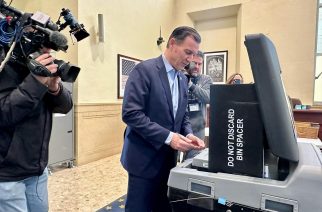
In less than three weeks, New York state voters will have the chance to declare their frustration with the seemingly endless trail of corruption by public officials.
On November 7, they will decide whether to give judges the power to revoke or reduce the pensions of legislators and other officials who are convicted of crimes related to their public service, regardless of when they took office.
The Public Integrity Reform Act, signed in August 2011, gives judges the power to revoke the pension of those convicted, but only if they entered into the state retirement system after November 3, 2011.
That loophole in the current law protects 52 percent of state senators and assembly members from losing their pensions if convicted of a crime.
A constitutional amendment known as Proposal 2 lands on this year’s ballot thanks in part to the 2015 convictions of former Senate Majority Leader Dean Skelos and former Assembly Speaker Sheldon Silver, which tightened the knot on a string of high-profile criminal cases and ethical violations by state lawmakers and other public officials.
Skelos and his son were found guilty of extortion, soliciting bribes in connection with a federal program and conspiracy to commit honest services fraud. The former Senate majority leader promoted various bills and regulations that resulted in financial gains for his son who was working for a company that would benefit from those regulations.
Regardless of the interests of his constituents, Skelos determined his legislative stance based on how it would benefit he and his family.
Despite his abuse of power, the former senator successfully filed for his annual retirement salary of $95,832.
In that same year, Silver was found guilty of honest services wire fraud and extortion. He used his position to obtain millions of dollars in bribes and kickbacks. The funds were concealed as legitimate income through the private law practice for which he worked.
He was sentenced to 12 years in prison before the U.S. Court of Appeals for the Second Circuit vacated his conviction. He too was permitted to collect his annual pension of $79,224.
Both elected officials, after serving in the trust of the public, were found guilty and began collecting their tax payer-funded retirement packages under conviction.
Since then, a Supreme Court ruling has changed the standard for what an “official act” by a public official is, and both Skelos and Silver’s convictions were overturned. Federal prosecutors have said they plan to re-try both men.
These cases brought attention to the Public Integrity Reform Act’s vulnerability, although Skelos and Silver are not the only ones to be benefited from it.
Since the year 2000, 33 state lawmakers have been forced from office due to accusations of corruption or misconduct, according to Jennifer Wilson, the program and policy director for the League of Women Voters of New York State.
From 2000 to 2015, 16 criminally convicted New York state public officials collected pension payouts, according to the New York State Comptroller’s Office.
PIRA as it stands, is especially slippery because it is difficult to prove in a court of law a direct connection between government duties and outside income. If the conviction is proved separate from the government duty, an official’s pension is not threatened.
Immediately following the Skelos and Silver convictions in 2015, state lawmakers began preparing a constitutional amendment for the 2017 ballot.
Voters will see the following question on the ballot: “The proposed amendment to section 7 of Article 2 of the State Constitution would allow a court to reduce or revoke the public pension of a public officer who is convicted of a felony that has a direct and actual relationship to the performance of the public officer’s existing duties. Shall the proposed amendment be approved?”
The proposed amendment would define “public officer” to mean the following:
• An official filling an elected office within New York;
• A person holding an office that is filled by appointment by the New York Governor, whether or not that appointment has to be confirmed by the Senate;
• A county, city, town, or village administrator, manager or equivalent position;
• The head of any state or local government department, division, board, commission, bureau, public benefit corporation, or public authority in New York who is vested with authority, direction, and control over that entity;
• The chief fiscal officer or treasurer of a municipal corporation or political subdivision in New York;
• A judge or justice of the Unified Court System; and
• A legislative, executive, or judicial employee who directly assists in the formulation of legislation, rules, regulations, policy, or judicial decision-making and who is designated by law as a policy-maker
Although most of the media attention has been on Proposal 1 regarding a constitutional convention, many lawmakers have been stressing the importance of giving judges more leeway to punish corrupt officials.
David Buchwald, D-Westchester, sponsored the bill, A.1749, in the Assembly that ultimately got Proposal 2 on the back of the November ballot.
“Government officials that betray the public trust should not collect a pension in the same way as those who serve honorably and I am pleased that over 60 members of the state assembly agree with me,” Buchwald said.
Senator Thomas Croci, R-Sayville, sponsored the same-as bill, S.418, that paved the way for Proposal 2.
“We are guardians of a great public trust,” Croci said, “A public officer has a duty to maintain this trust throughout their service and taxpayers should not be expected to pay for the pension when that breach of good faith has occurred.”
Good government groups have been heavily engaged in educating the public about proposals 1 and 2. For its part, the public seems on board with the premise of financially punishing corrupt officials
A Siena College Poll conducted a survey of 793 registered voters in July 2017. When presented with the official ballot question, 75 percent of voters supported the amendment while 18 percent said they opposed it.
The League of Women Voters of New York State is urging voters to pass Proposal 2 as both a strong message to elected officials and a practical way to deter corruption, according to the group’s policy director.
“Lawmakers are unwilling to pass ethics and campaign finance reforms because changing those laws would negatively impact their re-elections,” Wilson said. “Having a strict punishment in place that could hurt not only them, but also their families, is an effective way to discourage unethical behavior.”









